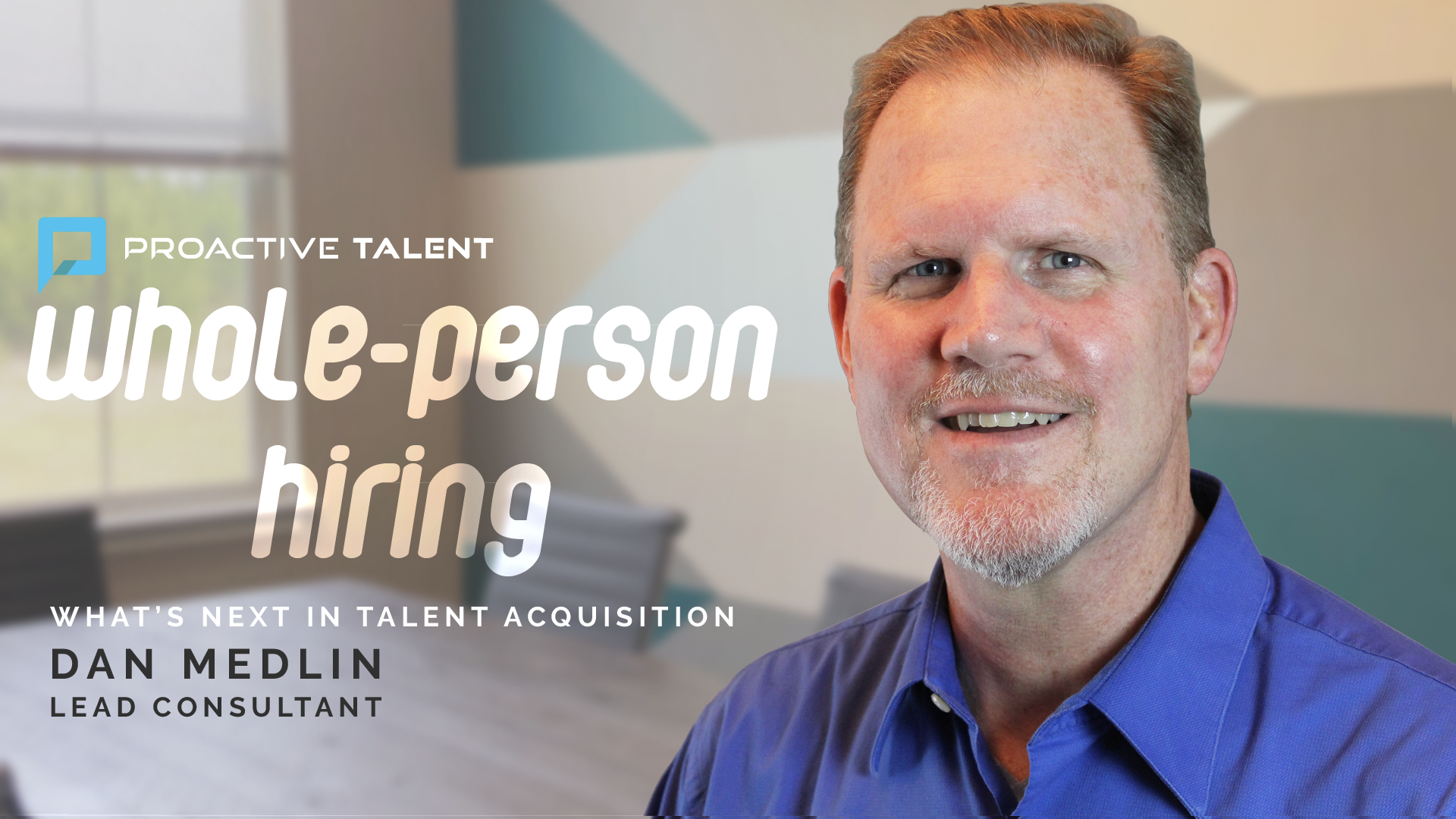 As a lead consultant for Proactive Talent, I help companies maximize their hiring solutions in a process we call Recruitment Optimization. While AI and machine learning will help our industry in incredible ways, I believe that the future of recruiting must include “whole-person hiring.”
As a lead consultant for Proactive Talent, I help companies maximize their hiring solutions in a process we call Recruitment Optimization. While AI and machine learning will help our industry in incredible ways, I believe that the future of recruiting must include “whole-person hiring.”
When people come to work, they bring their age, gender, culture, faith, family, finances, past experiences, and dreams. In whole-person hiring, you welcome this data, explore the advantages, and find ways to leverage these life experiences.
Sadly, companies often expect candidates to leave many of their whole-person gifts at home. Unconscious biases can turn ugly in recruitment, so we discourage our interviewers from cultivating discussions over things like the year the candidate graduated, the ages of their children, the basis of their core values, or where they were raised and how that environment shaped them.
However, these very details are the rich, savory ingredients that each candidate brings, which could very well be the rainmaking ingredients in your company. One person may have learned more from struggling as a young parent than anything they ever learned in college. Another person may have fought to be the first college graduate in their family, and another may have learned critical fundamental truths about life and existence through their faith, shaping how they lead teams or engage with your customers.

As recruiters, we must get to the point where we can leverage all of the gifts a person brings beyond just the job description and figure out how to unpack these gifts in the recruiting process ethically and legally.
According to Catrina Davis of Predictive Success, research conducted by Leadership IQ’s Global Talent Management Survey [2012] tracked 20,000 new hires and found that 46% of them failed within 18 months. Even more surprising than the failure rate was when new hires failed, 11% of the time it was for lack of skill and 89% was the result of apathy towards their work.
She goes on to assert that organizations who consider a new hire’s attitudes and beliefs, capacity to learn, and behavioral patterns tend to be more successful in their hiring decisions.
“Taking the whole-person approach to recruitment and selection is critical to ensuring the overall success of the organization, employee engagement, and productivity.” –Catrina Davis, Predictive Success.
I agree with Davis on assessing the whole-person; however, I disagree with the now common solution of relying on a combination of cognitive and personality assessments. Psychologists believe using these two assessments in conjunction with each other can provide a 40%-60% accurate picture of an individual’s predicted job performance, no matter what the position.
First, 40%-60% accuracy is unacceptable! When you look at the potential negative impact on your candidate pipeline and candidate experience the result does not have the ROI you need.
Second, candidates don’t enjoy completing a series of cognitive tests and personality assessments during their job application. When Indeed.com assessed the job applications of Fortune 500 companies in their 2015 publication, “What Matters to the Modern Candidate”, they found companies who asked candidates to complete 20+ fields on an application saw a drop-off rate of 44%. At 50+ questions, they saw a drop-off rate of 95%.

The third concern is that candidates might “fake it to make it” on personality tests. According to John A. Johnson Ph.D., “About one out of seven applicants tend to fake their responses during actual employment selection.” However, Johnson admits that “People can easily manipulate responses on obvious, self-report items.”
At the end of the day, candidates don’t enjoy taking personality assessments during their job application. You will suffer significant candidate drop-off rates, run the risk of poor ratings on Glassdoor for your candidate experience, and candidates can easily manipulate their responses on self-answered personality tests. This is obviously not ideal.
I believe the solution is a lot simpler and can give your candidates a better experience. The first part of the solution is to leverage your Applicant Tracking System (ATS) and include open-ended screening questions. Try framing one or two open-ended behavioral-based questions, like these:
-
Tell us about the top three key life experiences which have shaped your values and make you stand-out as a top candidate for this opportunity.
-
Beyond your education and training, and past professional experience, how have you learned critical life lessons which have prepared you for this opportunity?
As I mentioned before, interviewers may have an unconscious bias in recruitment, but when candidates share personal information that gives them an edge in the interview process, they are in the driver’s seat. And if you’re a job-seeker, don’t you want to join a company that allows you to bring your whole self into the picture?
As we approach a world where people are becoming more bonded with their work instead of a specific company, you should have the freedom to be who you are in the workplace. If someone doesn’t like you for who you are, it's their loss, and if they do, it’s their gain!
My friends at Whole Foods Market leverage personal information exceedingly well. They include around two to four open-ended questions on each online job application. They bring up the candidate’s answers in follow-up interviews, and they leave space on each interviewer’s feedback form for additional, voluntarily shared personal candidate data.
“If candidates are not driven by a purpose that is bigger than themselves, then they may have a difficult time staying intrinsically motivated in our culture. Their purpose does not have to be the same as Whole Foods Market, but it needs to be identified...we open the conversation to any personal things that they want to share...things that motivate them and inspire them. This gives us a much richer and more complex conversation.”
– Andres Traslavina, Director of Global Recruiting at Whole Foods Market
The next step is to explore the open-ended answers from candidates over the course of your interviews. Provide these answers to your hiring managers and interviewers, and bring them up in later stages of the interview process. Your candidates will feel valued and appreciated because you put in the time to actually review their application.
Before making a final decision on new hires, you will likely have a face-to-face interview with candidates. As I wrote in my book STAR Hiring, it is critical to integrate an assessment of the core values of each candidate to make sure they align with the core values of your company.

As a Lead Consultant at Proactive Talent, I recently had the honor to help some of our clients build a customized Values-Based Interview assessment, which provides the hiring team with a rich set of data to evaluate and select the right talent.
If you are determined to implement a personality test before hiring, it’s best done after onsite interviews, in-sync with your selection process, after notifying the candidate that they are your top pick for the role. Your candidate will be pleased to comply, and this will buy you time to work on reference checks, offer negotiation, and background checks. This will also provide data for the hiring manager and your new employee, on how they can leverage each other’s strengths in the workplace.
Companies who begin to unpack and maximize the myriad of life experiences that candidates bring to the picture will be companies that inspire, give back, grow, innovate, and lead; as they will be filled with people who enjoy their job and look forward to coming into work every day. This is the ROI of whole-person hiring!

THE AUTHOR
Dan Medlin
Proactive Talent, Lead Consultant
Email
LinkedIn
Website


